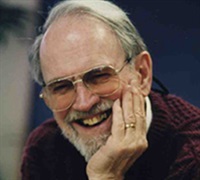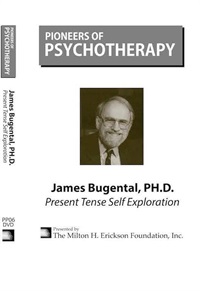James Bugental, PhD - Present Tense Self Exploration, 05/27/2000, Video Stream More info »
James Bugental, PhD - Present Tense Self Exploration
- Average Rating:
- Not yet rated
- Topic Areas:
- Clinical Demonstrations | Psychotherapy | Divorce | Marriage
- Categories:
- Pioneers of Psychotherapy | Evolution of Psychotherapy | Evolution of Psychotherapy 2000
- Faculty:
- James Bugental, PhD
- Course Levels:
- Master Degree or Higher in Health-Related Field
- Duration:
- 01:38:00
- Copyright:
-
May 27, 2000
- Publisher:
- The Milton H. Erickson Foundation Press
- License:
- Never Expires.
Description
Description:
James Bugental (2000) explains the importance of focusing on immediate subjective experiences. Bugental works with Glenda who is experiencing deep guilt about an upcoming divorce. Bugental addresses questions from the audience. A second volunteer explores issues surrounding her recent career change. Bugental explains his approach and answers questions.
Educational Objectives:
- Given a client, demonstrate the interview approach concerned with furthering the client's selfawareness.
- To describe a therapist mode which is focused on the client's immediate experiencing.
*Sessions may be edited for content and to preserve confidentiality*
Credits
Faculty

James Bugental, PhD Related Seminars and Products
James Bugental, PhD, was one of the predominant theorists and advocates of the Existential-Humanistic Therapy movement. He received his Ph.D. from Ohio State University in 1948, was named a Fellow of the American Psychological Association in 1955, and was the first recipient of the APA's Division of Humanistic Psychology's Rollo May Award. James devoted himself to teaching and writing; he was also an Emeritus Professor, Saybrook Institute, and an Emeritus Clinical Lecturer (formerly Associate Clinical Professor), Department of Psychiatry, Stanford University Medical School. In 1987, he was the recipient of the first annual Rollo May Award of the Mentor Society "for contributions to the literary pursuit," and in 1986, he received a certificate "in recognition of the distinguished contribution to the discipline of Clinical Psychology" from the Division of Clinical Psychology, American Psychological Association. He was a past president of the Association for Humanisitic Psychology and served on the editorial boards of eight professional journals. Bugental has written 150 articles, reviews, comments, and chapters in books edited by others.


